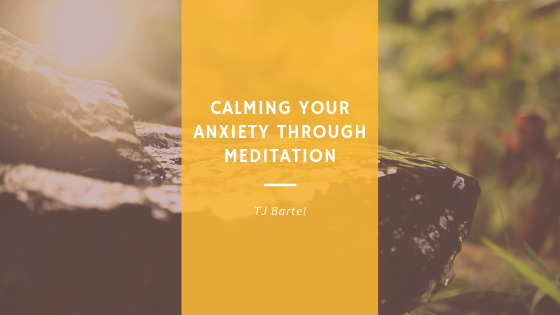Having that anxious feeling in the pit of your stomach is one of the worst feelings in the world. Throughout life, most individuals experience anxiety at one point or another. Anxiety can also manifest as sweaty palms, tension in the face, neck, shoulders or back.
There can be multiple causes for anxiety such as one’s financial stability, home life, social life, or education. How much anxiety you feel at any given time is dependent upon the wellbeing you experience in each of these arenas. Despite the multitude of stressors that may initiate anxiety, it’s comforting to know that there are many ways to quell these negative feelings and potentially remove the stressors altogether.
A few ways to calm anxiety include things like aromatherapy, exercise, breathing deeply, and even meditation. In fact, meditation has been extensively researched as an effective method to reduce anxiety. It has also been shown to have added benefits such as reducing stress, lowering blood pressure, and even increasing the effectiveness of smoking cessation.
Anxiety
Anxiety is described as the body and mind’s response to stressful, unfamiliar, or dangerous situations. It is inherently a survival mechanism that may have helped early ancestors stay alert in the presence of danger, but in today’s hectic world it can be triggered by non-life-threatening situations. Anxiety can present itself in various ways like a lack of concentration, restlessness, and irritability. It also has the potential to cause physical symptoms such as an accelerated heart rate, sweating, trembling, or even high blood pressure.
Common Causes of Anxiety
Although anxiety can certainly be triggered by dangerous situations, there are also a myriad of non-life-threatening situations that can spark it. The root cause behind anxiety varies from person to person, but there are a few known reasons it is experienced by many:
- Financial Stress – Financial stability is a common cause of stress for most and it can be a major cause of anxiety.
- Educational Pressure – Various educational pressures like worrying about grades, registration, or one’s social status in school can cause anxiety.
- Family Life – Family life can often cause stressful situations and bring about anxiety. Situations like marriage, pregnancy, and general discord can all be triggers.
- Trauma – Traumatic experiences can cause anxiety and even result in PTSD (post-traumatic stress disorder), a chronic stress response to a traumatic experience that has long subsided.
- Medications and other Substances – Medications and other substances can exacerbate or cause anxiety. Some medications may elicit anxiety as a side effect. Some substances like caffeine or other stimulants can both exacerbate or cause anxiety if too much is consumed as well.
Treating Anxiety
While treating the root cause behind anxiety disorders is often recommended by healthcare practitioners, there are multiple treatment options for calming anxiety. Seeing that anxiety may cause various symptoms, treatment options have to be implemented based on the circumstances of the individual. Treatment options for anxiety include medications, behavioral therapies, physical therapies, and even self-help options like meditation.
Meditation
Meditation is described as the process of learning to reside in the present moment without judgement. This includes the judgement of external situations, emotions, and thoughts. There are various techniques used in meditation, but one of the most common techniques is focusing on one’s breathing and returning to it when distractions arise. Through practicing meditation, one may experience a multitude of health benefits like reduced stress, lower blood pressure, and improved coping mechanisms to stressful situations.
How Meditation Works
While there isn’t one “right” way to meditate, there are a few meditation practices that can help individuals anchor themselves in the present moment. These include breathing techniques, body scanning, and even walking. These techniques help the individual focus their attention, and through practice, become aware of their own thoughts and emotions without letting them control their wellbeing.
Calming Anxiety with Meditation
Meditation is a highly effective tool for calming anxiety. After all, the practice itself deals with learning to allow thoughts and emotions through without judgmental tones. It is this rumination on thoughts or emotions that causes them to grow and for anxiety to persist. By learning to be aware of them without ruminating or judging them, one can take a step back and remain calm. However, just like any skill, it takes practice. A recommended start is setting a goal of three minutes each day to meditate until it becomes simple enough to move towards a higher goal.
To learn more about Tj Bartel and how he helps men and couples create more harmonious, deeply intimate relationships, visit his coaching website.
